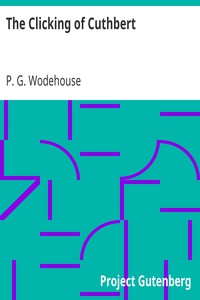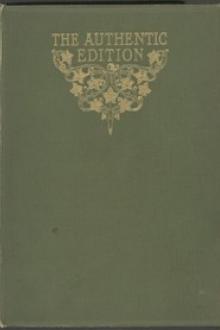The Clicking of Cuthbert by P. G. Wodehouse (acx book reading TXT) 📗

- Author: P. G. Wodehouse
Book online «The Clicking of Cuthbert by P. G. Wodehouse (acx book reading TXT) 📗». Author P. G. Wodehouse
Rupert stared.
"The seventeenth!"
"I am going to take that direction," said Ralph, pointing over the trees.
"But that will land your second or third shot in the lake."
"I have provided for that. I have a fiat-bottomed boat moored close by the sixteenth green. I shall use a mashie-niblick and chip my ball aboard, row across to the other side, chip it ashore, and carry on. I propose to go across country as far as Woodfield. I think it will save me a stroke or two."
I gasped. I had never before realized the man's devilish cunning. His tactics gave him a flying start. Arthur, who had driven straight down the course, had as his objective the high road, which adjoins the waste ground beyond the first green. Once there, he would play the orthodox game by driving his ball along till he reached the bridge. While Arthur was winding along the high road, Ralph would have cut off practically two sides of a triangle. And it was hopeless for Arthur to imitate his enemy's tactics now. From where his ball lay he would have to cross a wide tract of marsh in order to reach the seventeenth fairway—an impossible feat. And, even if it had been feasible, he had no boat to take him across the water.
He uttered a violent protest. He was an unpleasant young man, almost—it seems absurd to say so, but almost as unpleasant as Ralph Bingham; yet at the moment I am bound to say I sympathized with him.
"What are you doing?" he demanded. "You can't play fast and loose with the rules like that."
"To what rule do you refer?" said Ralph, coldly.
"Well, that bally boat of yours is a hazard, isn't it? And you can't row a hazard about all over the place."
"Why not?"
The simple question seemed to take Arthur Jukes aback.
"Why not?" he repeated. "Why not? Well, you can't. That's why."
"There is nothing in the rules," said Ralph Bingham, "against moving a hazard. If a hazard can be moved without disturbing the ball, you are at liberty, I gather, to move it wherever you please. Besides, what is all this about moving hazards? I have a perfect right to go for a morning row, haven't I? If I were to ask my doctor, he would probably actually recommend it. I am going to row my boat across the sound. If it happens to have my ball on board, that is not my affair. I shall not disturb my ball, and I shall play it from where it lies. Am I right in saying that the rules enact that the ball shall be played from where it lies?"
We admitted that it was.
"Very well, then," said Ralph Bingham. "Don't let us waste any more time. We will wait for you at Woodfield."
He addressed his ball, and drove a beauty over the trees. It flashed out of sight in the direction of the seventeenth tee. Arthur and I made our way down the hill to play our second.
It is a curious trait of the human mind that, however little personal interest one may have in the result, it is impossible to prevent oneself taking sides in any event of a competitive nature. I had embarked on this affair in a purely neutral spirit, not caring which of the two won and only sorry that both could not lose. Yet, as the morning wore on, I found myself almost unconsciously becoming distinctly pro-Jukes. I did not like the man. I objected to his face, his manners, and the colour of his tie. Yet there was something in the dogged way in which he struggled against adversity which touched me and won my grudging support. Many men, I felt, having been so outmanoeuvred at the start, would have given up the contest in despair; but Arthur Jukes, for all his defects, had the soul of a true golfer. He declined to give up. In grim silence he hacked his ball through the rough till he reached the high road; and then, having played twenty-seven, set himself resolutely to propel it on its long journey.
It was a lovely morning, and, as I bicycled along, keeping a fatherly eye on Arthur's activities, I realized for the first time in my life the full meaning of that exquisite phrase of Coleridge:
"Clothing the palpable and familiar With golden exhalations of the dawn,"for in the pellucid air everything seemed weirdly beautiful, even Arthur Jukes' heather-mixture knickerbockers, of which hitherto I had never approved. The sun gleamed on their seat, as he bent to make his shots, in a cheerful and almost a poetic way. The birds were singing gaily in the hedgerows, and such was my uplifted state that I, too, burst into song, until Arthur petulantly desired me to refrain, on the plea that, though he yielded to no man in his enjoyment of farmyard imitations in their proper place, I put him off his stroke. And so we passed through Bayside in silence and started to cover that long stretch of road which ends in the railway bridge and the gentle descent into Woodfield.
Arthur was not doing badly. He was at least keeping them straight. And in the circumstances straightness was to be preferred to distance. Soon after leaving Little Hadley he had become ambitious and had used his brassey with disastrous results, slicing his fifty-third into the rough on the right of the road. It had taken him ten with the niblick to get back on to the car tracks, and this had taught him prudence.
He was now using his putter for every shot, and, except when he got trapped in the cross-lines at the top of the hill just before reaching Bayside, he had been in no serious difficulties. He was playing a nice easy game, getting the full face of the putter on to each shot.
At the top of the slope that drops down into Woodfield High Street he paused.
"I think I might try my brassey again here," he said. "I have a nice lie."
"Is it wise?" I said.
He looked down the hill.
"What I was thinking," he said, "was that with it I might wing that man Bingham. I see he is standing right out in the middle of the fairway."
I followed his gaze. It was perfectly true. Ralph Bingham was leaning on his bicycle in the roadway, smoking a cigarette. Even at this distance one could detect the man's disgustingly complacent expression. Rupert Bailey was sitting with his back against the door of the Woodfield Garage, looking rather used up. He was a man who liked to keep himself clean and tidy, and it was plain that the cross-country trip had done him no good. He seemed to be scraping mud off his face. I learned later that he had had the misfortune to fall into a ditch just beyond Bayside.
"No," said Arthur. "On second thoughts, the safe game is the one to play. I'll stick to the putter."
We dropped down the hill, and presently came up with the opposition. I had not been mistaken in thinking that Ralph Bingham looked complacent. The man was smirking.
"Playing three hundred and ninety-six," he said, as





Comments (0)